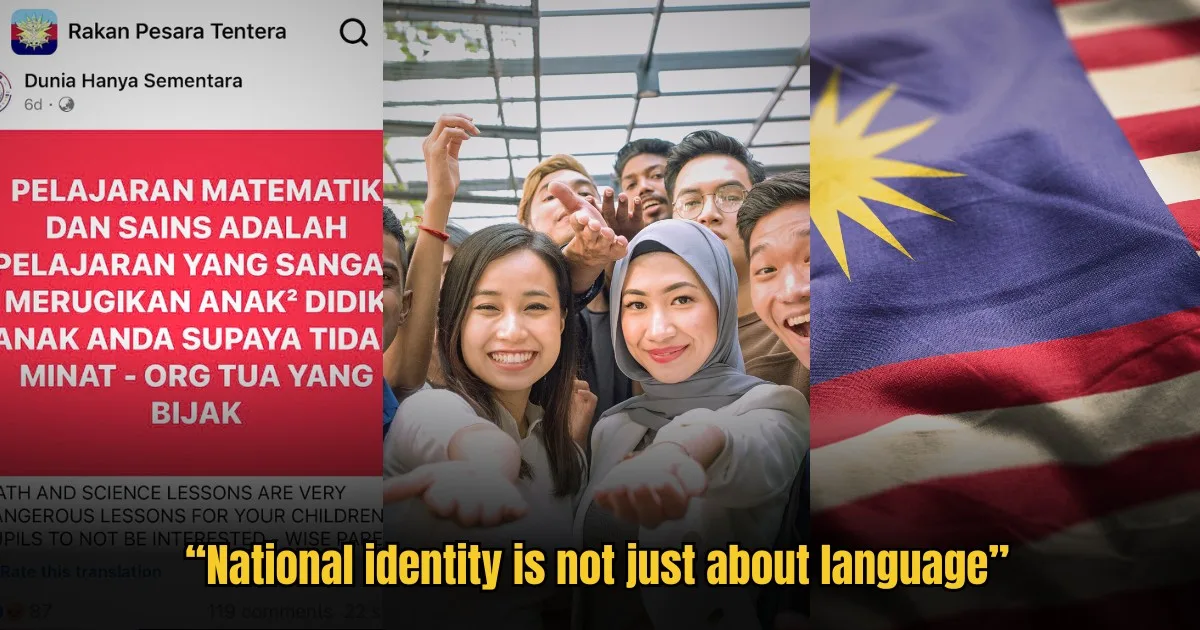Disclaimer: In Real Life is a platform for everyday people to share their experiences and voices. This article is the personal opinion of the author and does not necessarily echo the opinions of In Real Life.

With our national day coming up soon, some Malaysians are suggesting that we get rid of English altogether from our education syllabus.
For as long as Malaysians can remember, the back and forth debate of which language Mathematics and the science subjects should be taught has been going on with no end in sight.
After our independence, the colonial language policy was retained with English as the language medium in most schools. Then the National Language Act began the gradual transition to English and saw it to completion by the 1980s.
Then, English made its comeback in 2003 in accordance with the PPSMI policy which then Prime Minister, Mahathir Mohamad introduced. Then in 2012, Mathematics and the sciences reverted to Malay.
But then 2016 underwent an interesting development known as the Dual-Language Programme (DLP), where the subjects were taught in either English or Malay with bilingual examinations, depending on the region and school.
It seemed we had finally reached a middle ground. A win-win. But now, this topic has resurfaced once again, and certain groups are urging for a standardisation of the subjects in Malay.
A netizen took to Facebook urging a boycott of the English language.
Recently, a member of Facebook group, Dunia Hanya Sementara shared two posts in Rakan Pesara Tentera, an army veteran group, calling for a boycott of the English language.
In the post, they claimed that English as the language medium is undermining the Malay language and taking over, leading to the erosion of the Malay identity.
Although the post received criticism from the army veterans who were strong advocates of English, the post has since gone viral with over 1000 comments and shares. This has led to a heated debate on social media amongst Malaysians about the possibility of boycotting English in Malaysia.
The trend of adding English loanwords into Malay
As nonsensical as the suggestion is, the debate highlights an existing trend in Malaysia where we keep borrowing new loan words from English to be included in the Malay language.
For example, the word “eksesais” has recently been used in a Universiti Malaya certificate to mean “exercise”. Using a loanword from English in an official document is an odd choice, considering the Malay word “latihan” already exists.
TAHNIAH!
UM merakamkan setinggi-tinggi tahniah kepada Nurul Izzah Izzati Asri, pelajar Fakulti Sukan dan Sains Eksesais atas kejayaan memecahkan rekod kebangsaan dalam acara pecut berbasikal individu.#universitimalaya#homeofthebright#landofthebrave pic.twitter.com/JV5v2AvoJB
— Universiti Malaya (@unimalaya) August 11, 2024
Yes, languages overlap sometimes. Due to colonisation, words like bas (bus), demokrasi (democracy), and yes, even boikot (boycott) have been adopted into our national language, which has been going for decades. However, when Malay already has an intended word, why is the English counterpart used instead?
Why is the English vocabulary bleeding over into Malay vocabulary? Shouldn’t the two remain independent and sovereign languages? The answer to that depends on whether it’s more important to use prescriptivism or descriptivism in language.
Prescriptivism focuses on enforcing rules about how a language should be used. It prescribes correct ways of using language, based on traditional grammar and established norms. Descriptivism, on the other hand, describes how language is actually used by its speakers, without imposing rules or judgments. It recognises that all languages evolve over time and across different continents.
When critics complain about the degradation of the Malay language, they are essentially saying that Malay needs to stop evolving and changing over time. But the real issue isn’t that the Malay language is changing; it’s the sense of identity that changes with it.
After all, if you spent your whole life knowing that the Malay word for exercise is latihan, not eksesais, you’d be rightfully disturbed about the new word replacing the old one.
Is English replacing Malay as the national language?
Is it true that the English language is eroding the sovereignty of Malay, our national language, and by extension our Malaysian identity? Or is there a much bigger underlying issue at play here? Let’s evaluate the merits of his claim.
Firstly, yes, language does play a major role in a country and one’s identity. Language is a means of expressing cultural heritage. It connects individuals to their ancestors, traditions, and history, reinforcing a sense of belonging to their culture.
By prioritising English, there may be a gradual shift away from Malay traditions, stories, and cultural expressions, leading to a loss of Malay cultural heritage. Malay-speaking students may feel alienated or less competent, while younger generations of all races may associate English with progress, technology, and success, while perceiving Malay as less relevant or modern. This could result in a generational disconnect, where the younger population becomes increasingly detached from their linguistic and cultural roots.
Gradually, Malay may be undermined as the unifying language across diverse ethnic groups, weakening our sense of national identity. This leads to social and economic disparities that harm national cohesion.
Knowing how to speak English is a strength.
On the other hand, knowing English is a strength. It allows Malaysians to participate in the global community. It is a great asset in the workplace, increased opportunities to network, go abroad, and accelerate personal progress.
Emphasising English in certain subjects is a pragmatic approach to education. By teaching in English, Malaysia equips its students with the language skills necessary to engage with international research, higher education, and global job markets.
Meanwhile, Malay continues to play a central role in subjects like history, literature, religion, and social studies, where cultural identity is more directly reinforced.
The feeling of loss around one’s cultural identity is more likely to result from neglecting cultural education, especially in the fields of arts, history, and religion.
We need more local media in Malay as a counter to Western media.
National identity is more than mere language. It is also built up from the shows you watch, the books you read, the slang you use with your friends, your favourite Malaysian dish, your favourite local sports heroes, your favourite lepak corner, and so on.
To place the entire onus on English as the convenient scapegoat of the loss of Malay identity is wrong and inaccurate.
If anything, the dwindling of Malaysian identity and values stems from Western media influence. The global outreach of Western culture through media, entertainment, fashion, and technology has had a significant impact on local cultures worldwide, including Malaysia.
Younger generations tend to follow global trends and lifestyles, and it comes as no surprise that Malay culture has become less visible and influential.
The good news is, language and identity can be protected through policies that promote the use of Malay in public life, media, and cultural institutions. That’s why it’s crucial that the government and Malaysian society places a stronger emphasis on Malay culture, literature, and arts.
We need to promote more Malay history, culture, and practices.
The arts and entertainment industry in Malaysia has also taken on Western forms to stay current, relevant and to appeal to the masses. Without support for the traditional arts, Malaysian culture is more susceptible to being overshadowed by global cultural trends.
Traditional Malay arts such as batik, wayang kulit (shadow puppetry), silat (martial arts), and traditional music and dance forms are slowly becoming obsolete without appropriate funding. These art forms require resources for training, materials, and performance spaces, which requires government support.
We need to promote more of our traditional arts to keep the culture of Malaysia alive. We need to put more funding into our arts programmes so that we can celebrate our cultural and historical heritage.
The crux of the matter is that, the integration of the English language in school curricula cannot be made responsible for the dying out of Malaysian culture and identity. There is more at play to the watering down of Malay culture and identity than a few subjects being taught in English.
The bigger question is, is the Malaysian government carrying out relevant initiatives to preserve Malay cultures, arts and traditions?
What do you think of this story?
Submit your opinion to ym.efillaerni@olleh and you may be featured on In Real Life Malaysia.
Also read: I Let My Teacher Beat Me Rather Than Embarrass My Parents About Their Poor English
I Let My Teacher Beat Me Rather Than Embarrass My Parents About Their Poor English
More from Viral News
“I Miss My Home,” Shares M’sian Cosplayer Who Lost Everything in Putra Heights Explosion
This story is about Elizabeth Mae Hendroff, a Malaysian content creator and cosplayer whose life was turned upside down by …
“The Windows Were Shaking” Victims of the Putra Heights Gas Fire Share Their Firsthand Experiences
Residents of Putra Heights recall their narrow escape from a 30-meter high inferno that erupted from a gas leak in …
“RM15 For Roti John? Even McD Cheaper Lah,” Shares M’sian Shocked By Ramadan Bazaar Prices
Every Ramadan, Malaysians look forward to the festive bazaars selling mouthwatering dishes, from ayam percik to murtabak. But this year, …















